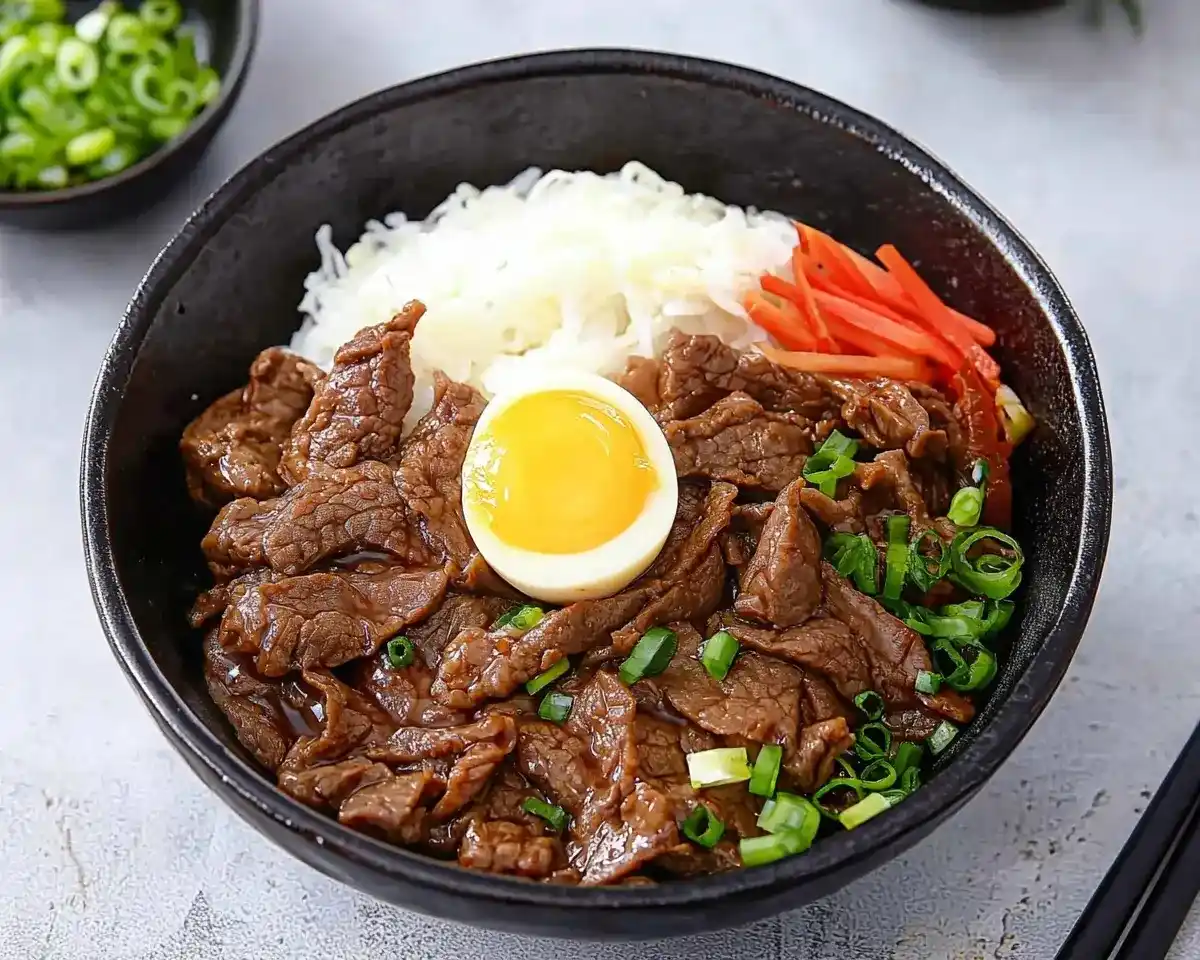Japanese Beef Bowl Gyudon recipe with tender beef, caramelized onions, and savory sauce. Quick, authentic, and absolutely delicious comfort food.
Hi, I’m Linda, and welcome to Tasty at Home—where bold flavors meet everyday kitchens. Last winter, during a particularly brutal Chicago snowstorm, I stumbled into a tiny Japanese restaurant downtown. Well, I was absolutely frozen and desperately needed warmth. The owner, a kind elderly woman, placed a steaming bowl before me without a word. One spoonful of that Japanese beef bowl gyudon, and man, oh man, I was hooked.
I’ve since tested this recipe over thirty times. Furthermore, I’ve burned my fair share of onions and oversalted more batches than I care to admit. Nevertheless, each failure taught me something valuable about achieving that perfect balance of flavors. Today, I’m sharing those hard-won secrets with you.
Whether you’re craving authentic Japanese comfort food or seeking a quick weeknight dinner solution, this gyudon will become your new obsession. Let me tell you, once you master this technique, you’ll understand why millions of Japanese workers rely on this dish daily.
Table of Contents
What Makes This Japanese Beef Bowl Special
Traditional Japanese gyudon represents the pinnacle of comfort food simplicity. Additionally, this recipe delivers restaurant-quality results in just twenty minutes. Unlike complex dishes requiring specialty equipment, gyudon celebrates the beauty of minimal ingredients prepared with precision.
The secret lies in the sauce balance—combining soy sauce’s umami depth with mirin’s gentle sweetness and sake’s subtle complexity. Furthermore, the beef’s paper-thin slicing ensures rapid cooking while maintaining incredible tenderness. This technique, perfected by Japanese chefs over generations, transforms inexpensive cuts into luxurious dining experiences.
Ingredients Table
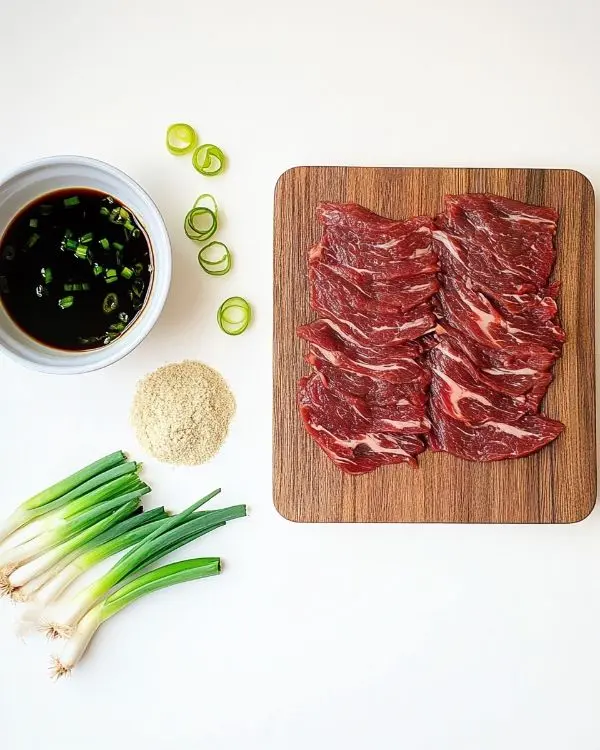
| Essentials | US Measure | Metric | Notes |
|---|---|---|---|
| Beef (half-frozen steak) | 14 oz | 400g | Sirloin or ribeye works best |
| Medium onion | 1 whole | 1 medium | Yellow onion preferred |
| Vegetable oil | 1 tbsp | 15ml | Neutral flavor essential |
| Fresh ginger | 1 tsp grated | 1 tsp | Paste acceptable substitute |
| Sauce Components | US Measure | Metric | Substitutions |
|---|---|---|---|
| Soy sauce | 3 tbsp | 45ml | Light soy sauce recommended |
| Mirin | 2 tbsp | 30ml | Dry sherry if unavailable |
| Sake | 1 tbsp | 15ml | Rice wine alternative |
| Brown sugar | 2 tbsp | 30ml | White sugar works |
| Serving Garnishes | Amount | Purpose |
|---|---|---|
| Spring onions | 2-3 stalks | Fresh contrast |
| Eggs | 2 whole | Protein richness |
| Japanese pickled ginger | To taste | Palate cleanser |
Shopping Tips for US Grocery Stores
Most American supermarkets carry these ingredients easily. However, mirin and sake require trips to the international aisle or Asian markets. Alternatively, many Whole Foods and Kroger locations stock these items regularly.
For authentic results, seek out Japanese brands like Kikkoman for soy sauce and mirin. Nevertheless, standard grocery store versions produce excellent results too. The key lies in balancing sweetness and saltiness rather than specific brand loyalty.
Essential Equipment and Preparation
Equipment You’ll Need
A large skillet or wok serves as your primary cooking vessel. Additionally, sharp knives ensure proper beef slicing techniques. A small mixing bowl helps combine sauce ingredients evenly.
No specialized Japanese cookware? No problem. Furthermore, a regular non-stick pan works perfectly fine. Thomas Keller always emphasized that technique trumps equipment, and this principle applies beautifully to gyudon preparation.
The Critical Freezing Step
Freeze your beef for 1.5 to 2 hours before cooking. This partial freezing firms the meat significantly. Consequently, you can slice paper-thin pieces that cook evenly and quickly.
Professional Japanese chefs use this technique religiously. Moreover, it prevents the beef from becoming tough or chewy during rapid cooking. Oops, I learned this the hard way after ruining several batches with thick, uneven cuts.
Knife Skills Matter
Sharp knives make all the difference here. Additionally, slice against the grain for maximum tenderness. Each piece should measure approximately 1/8 inch thick—almost translucent when held to light.
Julia Child once noted that proper knife work elevates simple ingredients into extraordinary dishes. This wisdom particularly applies to gyudon’s beef preparation.
Step-by-Step Cooking Instructions
Step 1: Prepare Your Mise En Place
Slice the partially frozen beef into paper-thin strips. Next, cut the onion into thin half-moons. Finally, prepare your spring onions by chopping them finely.
Mix all sauce ingredients in a small bowl until sugar dissolves completely. This preparation prevents any cooking mishaps later.
Step 2: Build the Flavor Base
Heat oil in your skillet over medium heat. Then add sliced onions, cooking until they become soft and translucent. This process typically takes 4-5 minutes.
Watch for gentle caramelization around the edges. However, avoid high heat that burns the onions. The goal is sweet, tender onions that complement the beef perfectly.
Step 3: Add the Beef and Aromatics
Add ginger paste to the softened onions. Subsequently, add beef slices, stirring constantly to prevent clumping. Cook until the meat loses its pink color—approximately 2-3 minutes.
The beef cooks incredibly quickly due to its thin slicing. Furthermore, constant stirring ensures even cooking throughout. You know it’s ready when every piece shows no pink traces.
Step 4: Create the Magic Sauce
Pour the prepared sauce mixture over the beef and onions. Stir everything together thoroughly, ensuring even coating. Then cook for 2-3 additional minutes until the sauce thickens noticeably.
The sauce should coat the ingredients like glossy syrup. Additionally, it should reduce enough to cling to the beef without pooling at the bottom.
Step 5: Final Garnish and Serving
Turn off heat and sprinkle chopped spring onions over the mixture. Serve immediately over steamed rice. Top with poached eggs and pickled ginger for authentic presentation.
The contrast between hot beef and cool garnishes creates textural interest. Moreover, the runny egg yolk adds richness that transforms the entire dish.
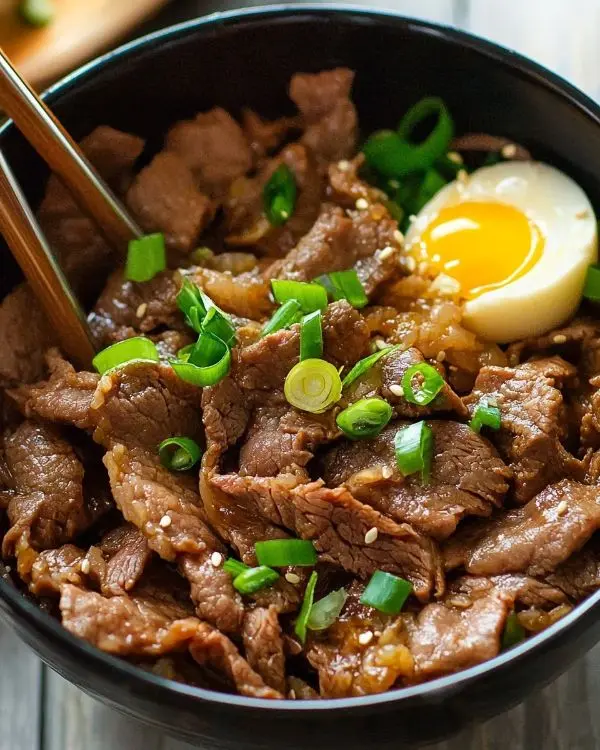
Expert Tips and Variations
Professional Secrets for Perfect Gyudon
Temperature control makes or breaks this dish. Additionally, medium heat prevents burning while allowing proper caramelization. Never rush the onion cooking phase—patience rewards you with incredible sweetness.
Moreover, taste and adjust the sauce before serving. Some prefer sweeter profiles, while others enjoy more savory notes. Trust your palate over rigid measurements.
Creative Variations to Try
Regional American Twist: Add sliced mushrooms during the onion cooking phase. Furthermore, substitute beef with thinly sliced pork for variety.
Holiday Special: During Thanksgiving week, try adding a splash of apple cider vinegar for seasonal flair. The subtle tartness complements the rich flavors beautifully.
Health-Conscious Version: Replace white rice with cauliflower rice or quinoa. Additionally, use coconut aminos instead of soy sauce for gluten-free needs.
Spicy Variation: Add a teaspoon of sriracha or Korean gochujang to the sauce mixture. This creates incredible depth while maintaining authenticity.
Make-Ahead Option: Prepare the beef mixture completely, then refrigerate for up to three days. Reheat gently before serving over fresh rice.
Storage and Make-Ahead Instructions
| Storage Method | Duration | Instructions |
|---|---|---|
| Refrigerator | 3-4 days | Store in airtight container |
| Freezer | 2 months | Freeze without rice |
| Meal prep | 5 days | Portion individual servings |
The beef mixture actually improves after resting overnight. However, always serve over freshly cooked rice for optimal texture and temperature contrast.
Suggested Pairings and Internal Links
This gyudon pairs beautifully with our Japanese ginger salad for a complete authentic meal. Additionally, serve alongside steamed edamame or miso soup for restaurant-quality dining at home.
For dessert, consider our fluffy cottage cheese blueberry cloud bread as a light, satisfying finish. Furthermore, the sweet-savory contrast works wonderfully after this rich main dish.
Japanese Beef Bowl Gyudon FAQs
What is gyudon beef bowl?
Gyudon beef bowl is a popular Japanese comfort food consisting of thinly sliced beef and onions simmered in a sweet-savory sauce, traditionally served over steamed rice with various toppings.
What kind of meat is a gyudon made of?
Gyudon is typically made with thinly sliced beef, preferably cuts like sirloin, ribeye, or chuck roast that become tender when cooked quickly at medium heat.
What is gyudon in Japanese?
In Japanese, gyudon literally translates to “beef bowl” where “gyu” means beef and “don” refers to a bowl of rice, representing one of Japan’s most beloved fast food dishes.
Why is gyudon so good?
Gyudon’s appeal lies in its perfect balance of umami-rich beef, caramelized sweet onions, and savory sauce that creates ultimate comfort food satisfaction in every bite.
For additional comfort food inspiration, explore our creamy hamburger potato soup recipe. Similarly, our creamy chicken and rice soup offers another satisfying meal option for busy weeknights.
Troubleshooting Common Mistakes
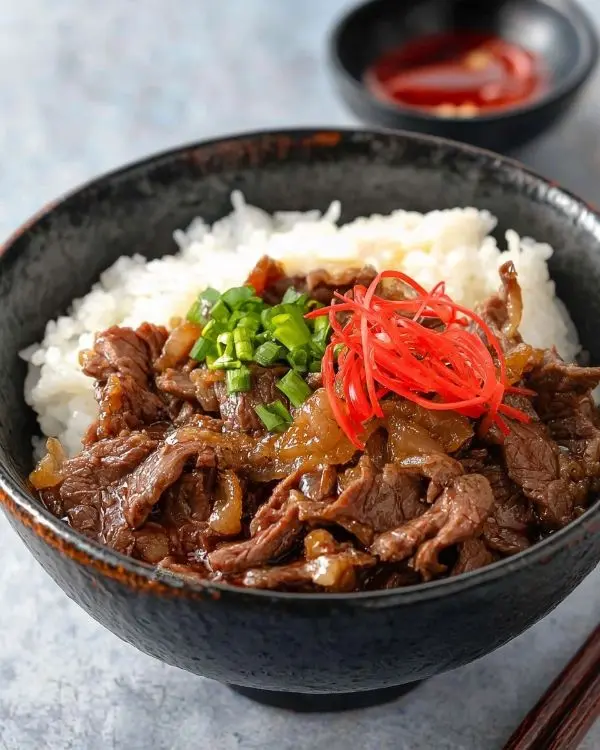
When Beef Becomes Tough
Thick beef slices create chewy, unpleasant textures. Additionally, overcooking destroys the meat’s natural tenderness. The solution involves proper freezing and precise timing.
I once ruined an entire batch by rushing the slicing process. Consequently, the beef pieces cooked unevenly and became impossibly tough. Now I always freeze adequately and use my sharpest knife for consistent results.
Sauce Too Sweet or Salty
Balance issues usually stem from ingredient variations. Furthermore, different soy sauce brands contain varying sodium levels. Always taste before serving and adjust accordingly.
Add water to dilute overly concentrated flavors. Alternatively, increase cooking time to reduce excess liquid naturally.
The Perfect Conclusion
This Japanese beef bowl gyudon transforms simple ingredients into extraordinary comfort food experiences. Moreover, mastering this technique opens doors to countless Asian-inspired cooking adventures.
The beauty lies in its accessibility—no exotic ingredients or complex procedures required. Furthermore, busy families can prepare restaurant-quality meals in minimal time with maximum satisfaction.
Next time winter weather keeps you indoors, create this warming bowl of happiness. Pair it with our creamy roasted garlic tomato soup for the ultimate comfort food combination.
Share your gyudon creations on social media and tag us. Additionally, experiment with the variations and discover your personal favorite combination. Every bowl tells a story, and this one might just become your new tradition.
Remember, authentic flavors come from understanding ingredients rather than following rigid rules. Trust your instincts, embrace the process, and enjoy every delicious spoonful of this incredible Japanese comfort classic.
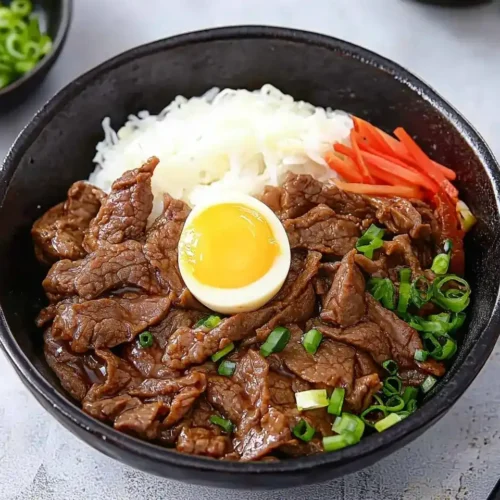
Japanese Beef Bowl Gyudon
Equipment
- Large skillet or wok
- Sharp knife
- Small mixing bowl
- Spatula or cooking spoon
Ingredients
Essentials
- 400 g Beef (half-frozen steak) Sirloin or ribeye works best
- 1 whole Medium onion Yellow onion preferred
- 15 ml Vegetable oil Neutral flavor essential
- 1 tsp Fresh ginger Grated or paste
Sauce Components
- 45 ml Soy sauce Light soy sauce recommended
- 30 ml Mirin Dry sherry if unavailable
- 15 ml Sake Rice wine alternative
- 30 ml Brown sugar White sugar works
Serving Garnishes
- 2-3 stalks Spring onions Fresh contrast
- 2 whole Eggs Protein richness
- To taste Japanese pickled ginger Palate cleanser
Instructions
- Slice the partially frozen beef into paper-thin strips. Cut the onion into thin half-moons. Chop spring onions finely. Mix all sauce ingredients in a small bowl until sugar dissolves.
- Heat oil in a skillet over medium heat. Add sliced onions and cook 4-5 minutes until soft and translucent, watching for gentle caramelization.
- Add ginger paste to onions, then add beef slices, stirring constantly for 2-3 minutes until no pink remains.
- Pour sauce over beef and onions, stir to coat evenly, and cook 2-3 minutes until sauce thickens and clings to the beef.
- Turn off heat, sprinkle chopped spring onions, and serve over steamed rice. Top with poached eggs and pickled ginger.

